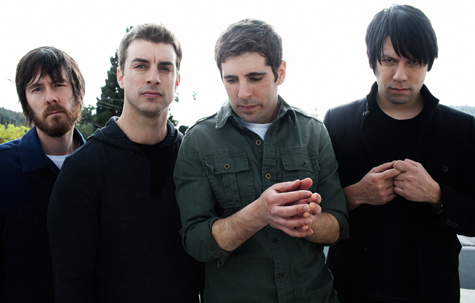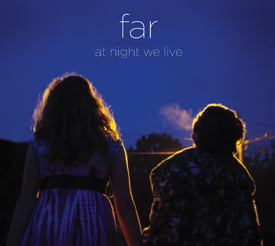
Far
At Night We Live
(Vagrant)
“Don’t call it a comeback…” Oft-quoted, L.L. Cool J’s assertion that he’s “been here for years” is perfect for occasions such as this. In the mid- to late ‘90s, Far blurred the line between backwards-cap, Addidas-clad nü metal and heart-on-sleeve emo rock, and managed to do so in the most graceful manner possible. Their emotionally potent, fist-pumping (not the Jersey Shore kind) brand of heavy music probably could have had a huge impact on the world outside of Sacramento–it should have. And though Far certainly carved a niche among music fans at large, their 1998 breakup truncated what could have been.
Of course, the members of Far never went anywhere. The band’s name has always been uttered with no small amount of reverence, and its members had no problem moving on to other successful projects: Guitarist Shaun Lopez went on to helm The Revolution Smile, bassist John Gutenberger played with Two Sheds and Jackpot and frontman Jonah Matranga became most notable after Far’s demise for his solo work under the name Onelinedrawing. He even got a good dose of radio airplay when he provided vocals for the Fort Minor (Mike Shinoda of Linkin Park’s side project) single “Where’d You Go.” At Night We Live, set for a May 25, 2010 release, will be Far’s first album in 12 years. Will it make good on the promise they showed over a decade ago, or is it too little too late?

At Night We Live makes a statement toward the former with its huge opening track, “Deafening.” Fittingly, the sound of a timer rattles a few clicks before erupting into a brief battery of powerful riffs. Gutenberger’s sinewy bass lines and drummer Chris Robyn work in perfect symbiosis, powering the verses before giving way to Lopez’s mammoth guitars on the choruses as Matranga wails, “It’s deafening,” as if he’s pointing out the obvious. Later, Gutenberger and Robyn shine again on “Dear Enemy,” a palpitating and circuitous rocker punctuated by a stuttering outro.
It’s not all punch, though, as Far shows that even after a long absence, they’re not afraid to mix it up. Atmospheric tracks “When I Could See” and the sprawling “The Ghost That Kept on Haunting” pull from a much more subtle sonic palette, allowing Matranga’s breathy vocals to take on a sort of dark croon. This creates just enough variety among a collection of songs that sticks to a pretty consistent tone and tempo.
If there were one complaint with At Night We Live, it would be that it’s a bit one note. Songs such as “Give Me a Reason” get lost in the shuffle and are easy to overlook. Also, the final track, “Pony,” the Ginuwine cover that sowed the seeds for Far’s reunion, serves as an anticlimactic conclusion for an album that starts off with such bombast–a clever novelty maybe, but a novelty nonetheless.
Otherwise, there should be more than enough positives here for those who have been waiting with crossed fingers in hopes that another Far album would come. Rest assured that it’s been worth waiting for. But whether or not the band’s shot at a share of the spotlight has come and gone remains to be seen.
Words by James Barone
Click for our interview with Far’s Jonah Matranga and Shaun Lopez [Dec. 2008]

Comments